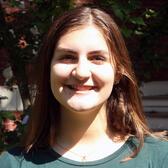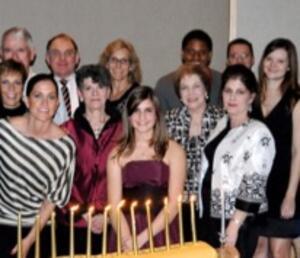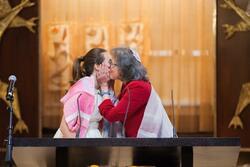My Jewish Role Model and her Humanist Role Models
You haven’t really lived until you’ve had a meal at my Aunt Roberta’s kitchen table. It’s small and made of light, grainy wood, and I really think it should be recognized as the capital of Jewish free thought. This, of course, has nothing to do with the make or model of the table, nor with the meals served on it, but has everything to do with the woman who owns it. I may be slightly biased, but Roberta Schiffer, my mother’s paternal aunt, is undoubtedly one of the most intelligent, introspective, and loving thinkers I have ever met.
Roberta once told me that there’s something inherently Jewish about discussing the deeper questions of life at a kitchen table, rather than in a parlor or living room. Maybe this Jewishness comes from the presence of food, or the informality of existential conversations, or the fact that her table has been witness to discussions on Jewish orthodoxy, Zionism, and gender relations within religion.
Roberta’s grandfather was a leader in an Orthodox synagogue, and she grew up, resentfully, sitting in the women’s balcony as men ran the show. She still remembers feeling disturbed when the men thanked G-d for not making them women as a part of their morning prayers. Her father, however, rejected the rituals of the religion. He believed in a higher power, but recognized that the ancient holy texts were written by men—and men, he said, were fallible. These two conflicting ideas about Judaism, as presented by her grandfather and father respectively, resulted in a less-than-defined Jewish identity for Roberta. As someone who grew up inside of the Jewish Reform movement, I’m grateful that I’ve always had access to egalitarian spaces. This, however, has definitely given me privilege I didn’t know I had until Roberta and I spoke about her grandfather’s synagogue. To me, egalitarianism has always seemed like an inherent right, but Roberta’s story about the Orthodoxy reminds me that this is not always so.
Considering Roberta’s complex relationship with Judaism, her role models are important to her for reasons not entirely dependent on Judaism. Her first role model was her not-so-observant father, who she perceived to be a fair and honest truth teller who claimed to be a strong supporter of equal rights for women—he most likely would have identified as a feminist if the phrase was available to him at the time. Reflecting on their relationship, however, Roberta remembers that his highest form of praise was telling her that she “thought like a man” when she would favor logic over emotion in decision making, or think critically rather than simply react. Her father was definitely a product of his time, so while I may not agree with his exact choice of words, I credit him for encouraging his daughter to think logically and critically, so as not to fall into the limitations of the societal stereotypes surrounding her gender. Roberta doesn’t think like a man because she isn’t one, but her confidence and thoughtfulness seem to be the result of a childhood not hindered by the push to simply sit there and be pretty.
When I asked Roberta if her current role models share any common traits, she responded that they’re all humanists. She described a humanist as a person who, with no ulterior motive or mission, respects other people because of the core belief that humans deserve respect. They are global thinkers who are willing to share whatever they feel they can offer to the world, and are overwhelmingly liberal. This value—decency and kindness without the expectation of a promised land—sounds awfully Jewish to me. Humanism may lack the rituals and ancient culture of the Jewish community, but the axis of morality on which the two creeds spin seem incredibly similar.
I haven’t totally figured out what I look for in a role model, myself, yet, but I know that Roberta is one of them. Her passion for empathy, respect, and education through inclusivity and community have shaped the way I look at the world and the people within it.
This piece was written as part of JWA’s Rising Voices Fellowship.








This is very heartwarming! Great work!